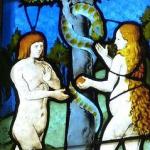How is it that these two disciples are not on a journey of joy today? It is the same day, after all, that the women discovered the empty tomb, were told Jesus had risen by two dazzling angels, and ran to tell the male disciples. How is it that, instead of a journey of joy, the walk to Emmaus scene is more like a grief therapy session? "We are not on a journey of joy," I can imagine these two saying. "We are just trudging down this path paved with disappointed hopes."
Everybody is on a journey of one kind or another, though we don't always recognize it and name it. I've never been on a cruise, but people who have say things like, "You'd never know that you were on a huge ocean liner cutting across the sea. There was no turbulence. There was amazing food and entertainment. You feel like you're in a luxury hotel rather than a boat."
In a privileged, comfortable life, a person might feel that "I'm not on a journey with its attendant discomforts and sacrifices. I'm here in my nest, making it as comfortable as I can." A colleague was telling me of how, in a sermon recently, he challenged his congregation with the question: How do you suffer or sacrifice on account of your faith? A woman came up to him after the service and offered her answer. "I suffer because of a couple of medical conditions, but I don't think I suffer or sacrifice on account of my faith." At least she was honest. But what kind of journey is she on?
What about the man in his 50s whose wife died and who now drinks more than he should? His thought might be, "I'm not on a journey. I'm in free fall."
I have a number of friends in their 80s who once were avid travelers, but who now stick close to home. "We don't feel the confidence we did when we were younger," said one man. "Our eyesight and hearing are not what they were. Our stamina and mobility are not what they were. My wife and I get lots of flyers for trips and tours. We read them with interest. The pictures are appealing. The itinerary is inviting. Then we put them in the recycle bin out in the garage." Just because they stay put physically, does that mean that he and his wife are no longer on a journey?
There is a woman in her 20s who goes from what she calls, "one dead end job to another." Where is the journey in that?
Everybody is on a journey, though we don't always recognize it. What kind of journey are you on? What direction is it taking you? Are you moving in the direction of liberation from destructive habits and debilitating anxiety toward peace, life, and joy? One of the questions the bishop asks candidates for ordination in the United Methodist Church is a traditional question that derives from John Wesley. "Are you going on to perfection?" By perfection Wesley didn't mean perfectionism, the absence from our lives of any mistakes, flaws, or errors. By perfection he meant perfection in love, the intentional, God-assisted journey toward an ever-deepening relationship with Jesus Christ.
As I stood with several colleagues in front of the bishop at our ordination service years ago, when he intoned the question "Are you going on to perfection?" I had to stop myself from blurting out "Not at this rate!"
And so the disciples on the way to Emmaus, pace down a path of despair. Their conventional hopes for a Messiah who would liberate their people from subjection had no place for a Messiah who would suffer and die, above all on a cross (Byrne, 188). Jesus, during his teaching ministry, had repeatedly described his journey, but they had not fully heard it because Messianic status did not fit with suffering, humiliation and death (Byrne, 188).
But now they are joined by a traveling companion. He places their sad journey in a new frame: the journey of Messiah mapped out in scripture. The witness of scripture as he opens it up to them, points to a Messiah who, through suffering on behalf of the people, brings freedom from bondage and victory over anything and anyone that oppose God's work in the world. Suffering, death, even death on a cross, and resurrection are not mutually exclusive, but are act one and act two of Messiah's ongoing journey, and of theirs as his disciples.
For Luke the resurrection is a "sign" to see, requiring that one's eyes be properly opened (v. 16). We remember that in John's account of the Resurrection, Mary mistook Jesus for the gardener, recognizing him only when he called her name. These two disciples on the road to Emmaus had not yet had the eyes of their faith opened so that they could recognize their traveling companion.
The plot of the walk to Emmaus scene epitomizes the plot of the whole Gospel of Luke (and, for that matter, of John). Jesus is our companion on the way, but we do not recognize him. The astounding tale of the women had not been enough to kindle these two men's faith. Their recognition of Jesus comes when he took bread, blessed, and broke it" (24:30). In that moment, recognition dawned. In that moment they had a change of heart: from being "slow of heart to believe" (24:25) to having hearts that burned within them as he spoke to them on the road (24:32).





